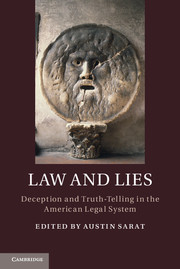Description
Law and Lies
Deception and Truth-Telling in the American Legal System
Coordinator: Sarat Austin
This is the first book to thematically investigate lying in the American legal system.
Language: English
Subject for Law and Lies:
Publication date: 07-2015
Support: Print on demand
Support: Print on demand
Description
/li>Contents
/li>Biography
/li>
Law has a strangely complicated relationship to deception. Though it sometimes takes a hard line on behalf of truth - 'the truth, the whole truth, and nothing but the truth' - competing values often cause law to look the other way. How and why is lying alternately accepted, condemned, or prosecuted? What are the government's interests in allowing or disallowing lying? Law and Lies is the first book to thematically address the role of lying in the American legal system. Undercover police agents are permitted to lie in the name of catching criminals, and government officials are permitted to lie in service of national security. In the case of the military's 'Don't ask, don't tell' policy, lying was not only permitted, but actively encouraged. A range of illuminating case studies reveal that the government's tolerance of deception is rarely as simple as the 'whole truth'.
Introduction Austin Sarat; 1. Where the law lies: constitutional fictions and their discontents Mary Anne Franks; 2. The artifice of advocacy: perjury and participation in the American adversary system Norman W. Spaulding; 3. Lies to manipulate, misappropriate, and acquire governmental power Helen Norton; 4. Lies, rape, and statutory rape Stuart P. Green; 5. Law and the production of deceit William N. Eskridge, Jr; Afterword: law, lies, and law schools Montre Carodine.
Austin Sarat is William Nelson Cromwell Professor of Jurisprudence and Political Science and Associate Dean of the Faculty at Amherst College and Justice Hugo L. Black Senior Faculty Scholar at the University of Alabama School of Law. He is the author or editor of numerous books, including the recent A World without Privacy (2014), Civility, Legality, and the Limits of Justice (2014) and Re-imagining To Kill a Mockingbird: Family, Community, and the Possibility of Equal Justice under Law (2013). His book, When Government Breaks the Law: Prosecuting the Bush Administration, was named one of the best books of 2010 by The Huffington Post.
© 2024 LAVOISIER S.A.S.



